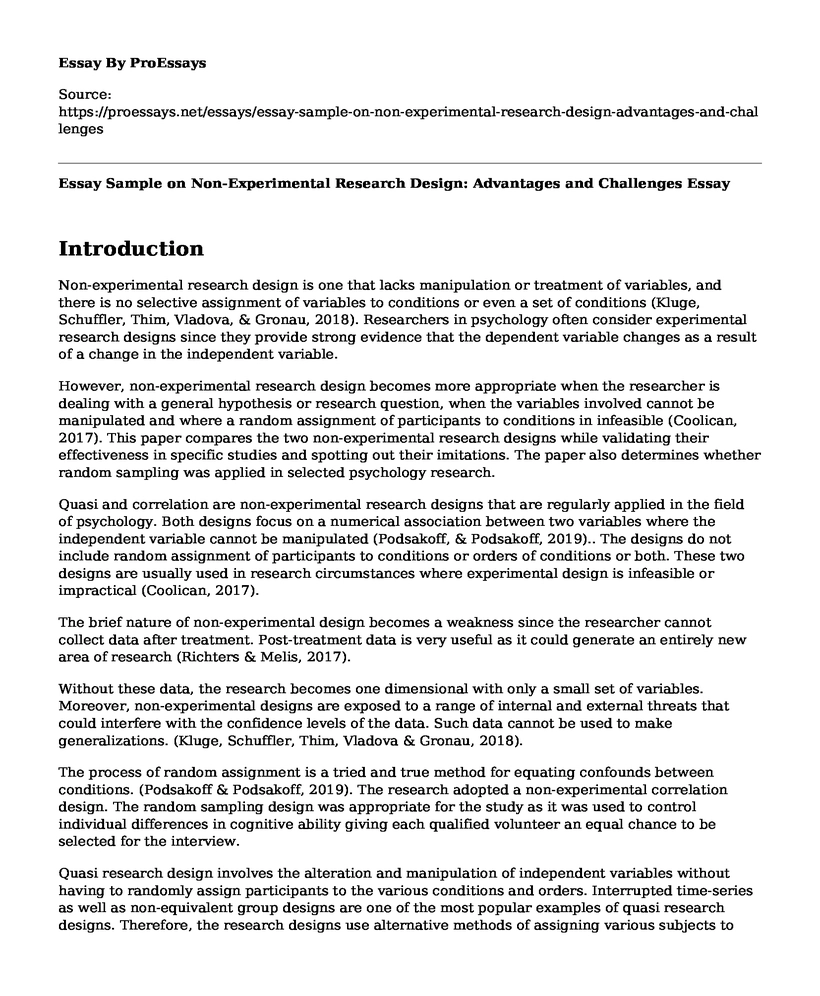Introduction
Non-experimental research design is one that lacks manipulation or treatment of variables, and there is no selective assignment of variables to conditions or even a set of conditions (Kluge, Schuffler, Thim, Vladova, & Gronau, 2018). Researchers in psychology often consider experimental research designs since they provide strong evidence that the dependent variable changes as a result of a change in the independent variable.
However, non-experimental research design becomes more appropriate when the researcher is dealing with a general hypothesis or research question, when the variables involved cannot be manipulated and where a random assignment of participants to conditions in infeasible (Coolican, 2017). This paper compares the two non-experimental research designs while validating their effectiveness in specific studies and spotting out their imitations. The paper also determines whether random sampling was applied in selected psychology research.
Quasi and correlation are non-experimental research designs that are regularly applied in the field of psychology. Both designs focus on a numerical association between two variables where the independent variable cannot be manipulated (Podsakoff, & Podsakoff, 2019).. The designs do not include random assignment of participants to conditions or orders of conditions or both. These two designs are usually used in research circumstances where experimental design is infeasible or impractical (Coolican, 2017).
The brief nature of non-experimental design becomes a weakness since the researcher cannot collect data after treatment. Post-treatment data is very useful as it could generate an entirely new area of research (Richters & Melis, 2017).
Without these data, the research becomes one dimensional with only a small set of variables. Moreover, non-experimental designs are exposed to a range of internal and external threats that could interfere with the confidence levels of the data. Such data cannot be used to make generalizations. (Kluge, Schuffler, Thim, Vladova & Gronau, 2018).
The process of random assignment is a tried and true method for equating confounds between conditions. (Podsakoff & Podsakoff, 2019). The research adopted a non-experimental correlation design. The random sampling design was appropriate for the study as it was used to control individual differences in cognitive ability giving each qualified volunteer an equal chance to be selected for the interview.
Quasi research design involves the alteration and manipulation of independent variables without having to randomly assign participants to the various conditions and orders. Interrupted time-series as well as non-equivalent group designs are one of the most popular examples of quasi research designs. Therefore, the research designs use alternative methods of assigning various subjects to control and treatment groups. Quasi research design optimizes the techniques of qualitative research.
Conclusion
Non-experimental research design is one that lacks manipulation or treatment of variables, and there is no selective assignment of variables to conditions or even a set of conditions. Quasi and correlation are non-experimental research designs that are regularly applied in the field of psychology. Both designs focus on a numerical association between two variables where the independent variable cannot be manipulated.
References
Richters, A., & Melis, R. J. (2017). Quasi-experimental study designs: making a case for non-experimental designs in the spectrum - Journal of clinical epidemiology, 91, 146.
Kluge, A., Schuffler, A. S., Thim, C., Vladova, G., & Gronau, N. (2018, July). Putting intentional organizational forgetting to an empirical test: Using experimental designs to measure the forgetting of organizational routines. In Proceedings of the IFKAD Conference (pp. 245-267).
Podsakoff, P. M., & Podsakoff, N. P. (2019). Experimental designs in management and leadership research: Strengths, limitations, and recommendations for improving publishability. The Leadership Quarterly, 30(1), 11-33.
Coolican, H. (2017). Research methods and statistics in psychology. Psychology Press.
Cite this page
Essay Sample on Non-Experimental Research Design: Advantages and Challenges. (2023, Mar 28). Retrieved from https://proessays.net/essays/essay-sample-on-non-experimental-research-design-advantages-and-challenges
If you are the original author of this essay and no longer wish to have it published on the ProEssays website, please click below to request its removal:
- Stress Hormones Negative Impacts on the Respiratory and the Cardiovascular Systems
- Research Paper on Post-Traumatic Stress Disorder on Rape Victims
- Stress Management Annotated Bibliography
- Milan Systematic Family Therapy Essay Example
- Essay Example on Sleep, Depression & Postpartum: A Randomized Trial in the US Upper Midwest
- Coping With Stress: Denial as a Defense Mechanism - Essay Sample
- Legal Case: Dr. Thapar & Lilly's PTSD Defense - Essay Sample







